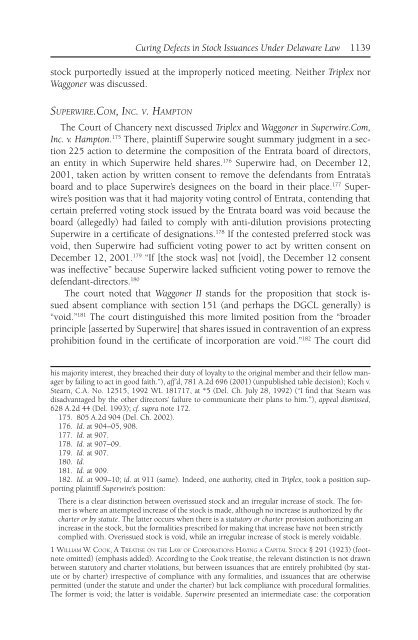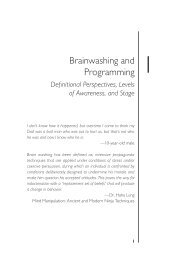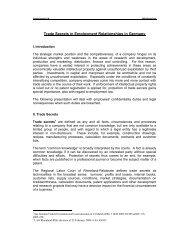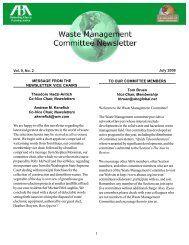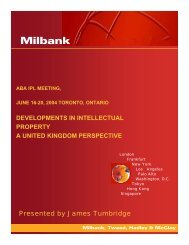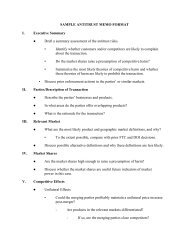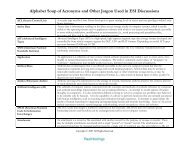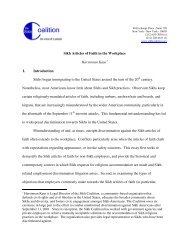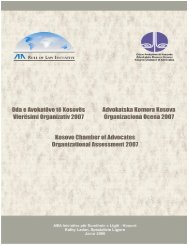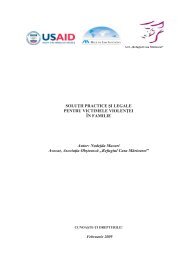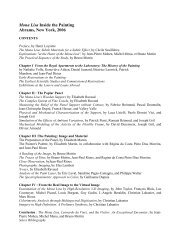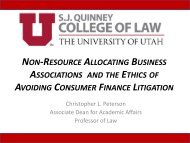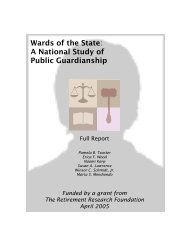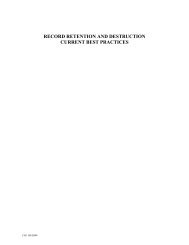Curing Defects in Stock Issuances - American Bar Association
Curing Defects in Stock Issuances - American Bar Association
Curing Defects in Stock Issuances - American Bar Association
You also want an ePaper? Increase the reach of your titles
YUMPU automatically turns print PDFs into web optimized ePapers that Google loves.
<strong>Cur<strong>in</strong>g</strong> <strong>Defects</strong> <strong>in</strong> <strong>Stock</strong> <strong>Issuances</strong> Under Delaware Law 1139<br />
stock purportedly issued at the improperly noticed meet<strong>in</strong>g. Neither Triplex nor<br />
Waggoner was discussed.<br />
SUPERWIRE.COM, INC. V. HAMPTON<br />
The Court of Chancery next discussed Triplex and Waggoner <strong>in</strong> Superwire.Com,<br />
Inc. v. Hampton. 175 There, pla<strong>in</strong>tiff Superwire sought summary judgment <strong>in</strong> a section<br />
225 action to determ<strong>in</strong>e the composition of the Entrata board of directors,<br />
an entity <strong>in</strong> which Superwire held shares. 176 Superwire had, on December 12,<br />
2001, taken action by written consent to remove the defendants from Entrata’s<br />
board and to place Superwire’s designees on the board <strong>in</strong> their place. 177 Superwire’s<br />
position was that it had majority vot<strong>in</strong>g control of Entrata, contend<strong>in</strong>g that<br />
certa<strong>in</strong> preferred vot<strong>in</strong>g stock issued by the Entrata board was void because the<br />
board (allegedly) had failed to comply with anti-dilution provisions protect<strong>in</strong>g<br />
Superwire <strong>in</strong> a certifi cate of designations. 178 If the contested preferred stock was<br />
void, then Superwire had suffi cient vot<strong>in</strong>g power to act by written consent on<br />
December 12, 2001. 179 “If [the stock was] not [void], the December 12 consent<br />
was <strong>in</strong>effective” because Superwire lacked suffi cient vot<strong>in</strong>g power to remove the<br />
defendant-directors. 180<br />
The court noted that Waggoner II stands for the proposition that stock issued<br />
absent compliance with section 151 (and perhaps the DGCL generally) is<br />
“void.” 181 The court dist<strong>in</strong>guished this more limited position from the “broader<br />
pr<strong>in</strong>ciple [asserted by Superwire] that shares issued <strong>in</strong> contravention of an express<br />
prohibition found <strong>in</strong> the certifi cate of <strong>in</strong>corporation are void.” 182 The court did<br />
his majority <strong>in</strong>terest, they breached their duty of loyalty to the orig<strong>in</strong>al member and their fellow manager<br />
by fail<strong>in</strong>g to act <strong>in</strong> good faith.”), aff’d, 781 A.2d 696 (2001) (unpublished table decision); Koch v.<br />
Stearn, C.A. No. 12515, 1992 WL 181717, at *5 (Del. Ch. July 28, 1992) (“I fi nd that Stearn was<br />
disadvantaged by the other directors’ failure to communicate their plans to him.”), appeal dismissed,<br />
628 A.2d 44 (Del. 1993); cf. supra note 172.<br />
175. 805 A.2d 904 (Del. Ch. 2002).<br />
176. Id. at 904 –05, 908.<br />
177. Id. at 907.<br />
178. Id. at 907–09.<br />
179. Id. at 907.<br />
180. Id.<br />
181. Id. at 909.<br />
182. Id. at 909–10; id. at 911 (same). Indeed, one authority, cited <strong>in</strong> Triplex, took a position support<strong>in</strong>g<br />
pla<strong>in</strong>tiff Superwire’s position:<br />
There is a clear dist<strong>in</strong>ction between overissued stock and an irregular <strong>in</strong>crease of stock. The former<br />
is where an attempted <strong>in</strong>crease of the stock is made, although no <strong>in</strong>crease is authorized by the<br />
charter or by statute. The latter occurs when there is a statutory or charter provision authoriz<strong>in</strong>g an<br />
<strong>in</strong>crease <strong>in</strong> the stock, but the formalities prescribed for mak<strong>in</strong>g that <strong>in</strong>crease have not been strictly<br />
complied with. Overissued stock is void, while an irregular <strong>in</strong>crease of stock is merely voidable.<br />
1 WILLIAM W. C OOK, A TREATISE ON THE LAW OF CORPORATIONS HAVING A CAPITAL STOCK § 291 (1923) (footnote<br />
omitted) (emphasis added). Accord<strong>in</strong>g to the Cook treatise, the relevant dist<strong>in</strong>ction is not drawn<br />
between statutory and charter violations, but between issuances that are entirely prohibited (by statute<br />
or by charter) irrespective of compliance with any formalities, and issuances that are otherwise<br />
permitted (under the statute and under the charter) but lack compliance with procedural formalities.<br />
The former is void; the latter is voidable. Superwire presented an <strong>in</strong>termediate case: the corporation


